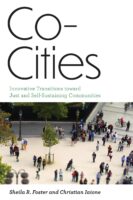 How might the commons paradigm be applied to cities in a more focused, effective way? To find some answers, I recently interviewed two leading thinkers and advocates for urban commons, Sheila R. Foster and Christian Iaione, on my podcast Frontiers of Commoning (episode #37). They just published Co-Cities: Innovative Transitions Toward Just and Self-Sustaining Communities, a book that synthesizes much of what they’ve learned after years exploring this topic.
How might the commons paradigm be applied to cities in a more focused, effective way? To find some answers, I recently interviewed two leading thinkers and advocates for urban commons, Sheila R. Foster and Christian Iaione, on my podcast Frontiers of Commoning (episode #37). They just published Co-Cities: Innovative Transitions Toward Just and Self-Sustaining Communities, a book that synthesizes much of what they’ve learned after years exploring this topic.
Foster is an urban law and policy professor at Georgetown University who studies the role of cities in promoting social and economic well-being, climate justice, better governance, and in addressing racial inequality. Iaione is professor of urban law and policy at Luiss Guido Carli University in Rome, Italy, where he pioneers creative ways for city governments to work with urban commoners and other stakeholders.
I first met up with Chris ten years ago when he was developing the Bologna Regulation for the Care and Regeneration of Urban Commons — a formal legal and bureaucratic system for coordinating citizen collaboration with the city government. The Regulation gave rise to hundreds of “pacts of collaboration” through which self-organized citizen groups were given the authority – and city assistance – to rehabilitate abandoned buildings, manage kindergartens and eldercare centers, take care of urban green spaces, and much else.
This seminal idea of leveraging citizen energies, and coordinating it with the knowledge and resources of government, business, civic players, and knowledge institutions, has spread to dozens of other cities in Italy and around the world.
The primary vehicle for Foster and Iaione’s work is an interdisciplinary clinic called LabGov – the Laboratory for the Governance of the City as a Commons – which the two of them co-direct. LabGov develops new types of collaborative projects in cities, working with many universities and other knowledge institutions around the world.
While Foster and Iaione start with the design principles identified by Elinor Ostrom, the great scholar of the commons, they acknowledge “the limits of her framework and its applicability to the urban environment.” Unlike traditional commons of farmland, water, or fisheries, where uses have great latitude to devise their own governance rules, Foster and Iaione concluded that “Ostrom’s framework needs to be adapted to the reality of urban environments that are often crowded, congested, socially diverse, economically complex, and heavily regulated.”
So our discussion focused on the varieties of ways that urban commons are built in very different urban settings, and the cross-currents of politics, personalities, and histories that require a larger conceptual approach. They call their framework the “co-city protocol,” and it relies on six distinct phases: knowing, mapping, practicing, prototyping, testing, and modeling. This is not a strict blueprint as such, but more of a template that is adapted to the unique circumstances of a particular city.
In Baton Rouge, Louisiana, the city redevelopment authority invited LabGov to help to improve an African-American neighborhood whose infrastructure had been neglected for decades: a lack of sidewalks, inadequate street lights, not enough good housing. Foster explains,
“We brought in a number of other actors to create a community land bank and land trust that could hold on to vacant properties, and to redevelop it into, for instance, an eco-park, a food incubator, and housing.”
The co-city process requires a lot of community-wide discussion and deliberation to come up with solutions, and a frank grappling with the elephants in the room. Iaione stresses that “failure is always around the corner” in these efforts, but this should not be seen as an indictment of the process. Markets and government frequently fail to achieve their goals, said Iaione, “so why are communities not allowed to fail?”
Like every other human phenomenon, commoning can lead to failures, Iaione noted. But it also leads to some highly rewarding outcomes, such as the neighborhood-based energy co-ops in Italy and elsewhere in Europe. “We were at the forefront of this work seven or eight years ago,” said Iaione, but we failed so many times before we could get it off the ground. Now community production of energy is a reality,” he said. It’s even embedded in the regulatory framework in the European Union, and regulatory authorities and utilities even negotiate terms with local communities, which are now important nodes in energy production and distribution.
You can listen to my podcast conversation with Foster and Iaione here. A transcript can be found here. And here’s a link to more about their Co-Cities book, which the Association of American Publishers recently honored with its annual PROSE Award for scholarly works, in the Architecture and Urban Planning Category.






